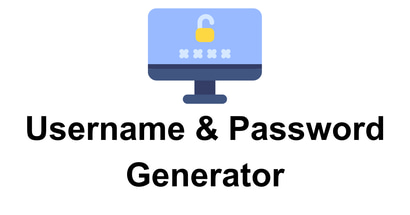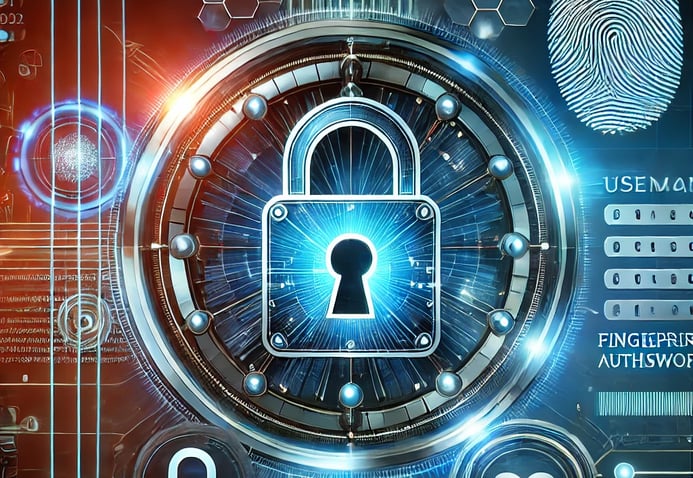Why a Strong Username and Password Matter for Online Security
In today’s digital age, online security is more important than ever.
In today’s digital age, online security is more important than ever. Cybercriminals are always looking for ways to steal personal information, and weak usernames and passwords are often the easiest way for them to gain access. Whether you’re setting up a social media account, an online banking profile, or a gaming account, having a secure username and password can protect you from hackers and identity theft.
The Importance of a Good Username
A username is often the first step in securing your account. Many people make the mistake of using their real names or common phrases, making it easier for cybercriminals to guess. Here are some tips for creating a strong and unique username:
Avoid using personal information: Your name, birthdate, or pet’s name are easy to guess.
Use a combination of letters, numbers, and symbols: This makes your username more unpredictable.
Make it unique: Don’t use the same username across multiple accounts.
Be creative: Fun, random, and unique usernames are harder to guess and add a layer of security.
If you struggle to come up with a strong username, using a username generator can help you create something original and secure.
Why You Need a Strong Password
A weak password can make it easy for hackers to access your accounts. Many people still use simple passwords like “123456” or “password,” which can be cracked within seconds. Here’s how to create a strong password:
Use at least 12-16 characters: Longer passwords are harder to crack.
Include uppercase and lowercase letters, numbers, and symbols: This increases complexity.
Avoid dictionary words or predictable sequences: Hackers use software that can quickly guess common words and patterns.
Use a password manager: This helps generate and store complex passwords so you don’t have to remember them.
The Dangers of Weak Credentials
Using weak usernames and passwords puts you at risk of:
Identity theft: Hackers can steal your personal information and use it for fraud.
Financial loss: If your banking credentials are compromised, you could lose money.
Privacy invasion: Cybercriminals can access your private conversations and personal data.
Account takeovers: If your email or social media accounts are hacked, cybercriminals can impersonate you or lock you out.
The Role of a Username and Password Generator
A username and password generator helps you create unique, strong, and secure credentials instantly. Instead of struggling to think of something original, a generator can provide random yet memorable usernames and passwords tailored to your needs.
Additionally, some generators allow customization based on character length, special symbols, and difficulty levels, ensuring that you get a password that meets security standards without being too difficult to manage.
Best Practices for Keeping Your Credentials Secure
Aside from creating strong usernames and passwords, follow these security tips to keep your accounts safe:
Enable Two-Factor Authentication (2FA): This adds an extra layer of security by requiring a second form of verification, such as a code sent to your phone.
Change Your Passwords Regularly: Update your passwords every few months to minimize risk.
Never Reuse Passwords: Using the same password across multiple accounts increases your vulnerability.
Be Cautious of Phishing Scams: Hackers often try to trick users into revealing their login information via fake emails and websites.
Log Out of Public Devices: If you access your accounts on a shared or public computer, always log out when you're done.
Monitor Your Accounts for Unusual Activity: Regularly check your login history and security settings for any unauthorized access.
Use Biometric Authentication: Many devices now offer fingerprint or facial recognition for an extra layer of security.
Keep Security Software Updated: Install antivirus software and keep it updated to prevent malware attacks.
How Hackers Exploit Weak Credentials
Hackers use a variety of techniques to gain unauthorized access to accounts. Some common methods include:
Brute Force Attacks: Automated programs try thousands of password combinations until they find the correct one.
Credential Stuffing: Cybercriminals use leaked username-password combinations from past data breaches to access multiple accounts.
Social Engineering: Hackers manipulate victims into revealing login credentials by pretending to be trusted sources.
Keylogging: Malicious software records keystrokes to capture usernames and passwords.
Man-in-the-Middle Attacks: Cybercriminals intercept data between users and websites to steal login credentials.
The Future of Online Security
With the increasing sophistication of cyber threats, online security measures must continue to evolve. Some emerging trends in cybersecurity include:
Passwordless Authentication: Technologies like biometric authentication and one-time passcodes are replacing traditional passwords.
AI-Based Security Systems: Artificial intelligence helps detect suspicious login attempts and prevent unauthorized access.
Blockchain for Identity Protection: Decentralized identity solutions can enhance privacy and security.
Zero Trust Security Models: Companies and users are adopting strict verification policies to limit unauthorized access.
Conclusion
Cybersecurity starts with strong login credentials. Using a reliable username and password generator ensures your online accounts are secure, protecting your personal and financial information from cyber threats. Take control of your online security today—don’t let weak passwords put you at risk! By following these tips, you can enjoy the internet safely while keeping hackers at bay. As cyber threats continue to evolve, staying informed and implementing security best practices will help keep your digital identity secure for years to come.


